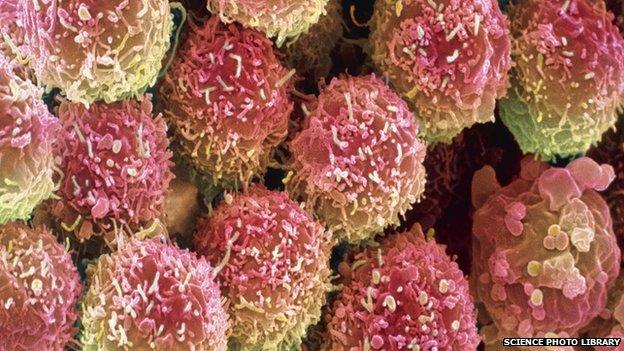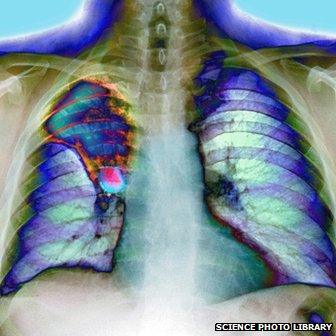Lung cancer rates among women in the UK increase by 73%
- Published

Cancer Research UK says smoking trends have caused a rise in lung cancer among women and a fall among men
Lung cancer rates among women in the UK have risen by 73% since 1975, while falling by 47% among men.
Cancer Research UK, which has released the figures, says the changes are because of contrasting trends in smoking habits in men and women.
The charity says the proportion of men who smoke has been declining since the 1950s, while figures for women did not start to drop until the 1970s.
Overall, lung cancer rates, external across the UK have fallen by 20% since 1975.
The latest figures show there were around 43,500 cases of lung cancer in the UK in 2011 - approximately 23,800 men and 19,700 women.
In the same year there were around 35,200 deaths from lung cancer, including 19,600 men and 15,600 women.
Save lives
Dr Harpal Kumar, chief executive of Cancer Research UK, said the figures provided a "stark reminder" that lung cancer remains a big challenge and called for a renewed effort to tackle the disease.
The new figures reveal that rates of lung cancer among women now stand at 41 women in every 100,000, up from 23 in every 100,000 in 1975.
For men, the lung cancer rate is now 59 in every 100,000, down from 112 per 100,000 people in 1975.
The highest rates in England are found in the north, while the lowest rates are in the east, south-east and south-west.
In Scotland, lung cancer rates in women have almost doubled over the past 40 years and are among the highest in the world.

Rates of lung cancer among women now stand at 41 women in every 100,000
Lung cancer remains the second most common cancer in the UK and the biggest cancer killer. Around 87% of cases are attributable to smoking.
"We need to improve awareness of the possible signs and symptoms of lung cancer and urge people - especially those at increased risk - to go to their doctor without delay if they spot any symptoms," said Cancer Research UK's director of early diagnosis Sara Hiom.
"We know that if people go to their GP as soon as they're aware of symptoms it can make all the difference and save lives."
Death sentence
Fewer than 10% of people diagnosed with lung cancer survive for five years or more after diagnosis, Cancer Research UK says.
"These figures provide a stark reminder that lung cancer remains one of the biggest challenges in cancer research," Dr Kumar said.
"The disease kills more than twice as many people as the second most common cancer killer - bowel cancer - and this looks set to continue unless we all do more.
"The attitude that a lung cancer diagnosis is a death sentence must change."
Dr Kumar said the charity wanted to make the UK "a leader in lung cancer research".
- Published20 March 2014
- Published19 December 2013
- Published28 November 2013
- Published28 November 2013